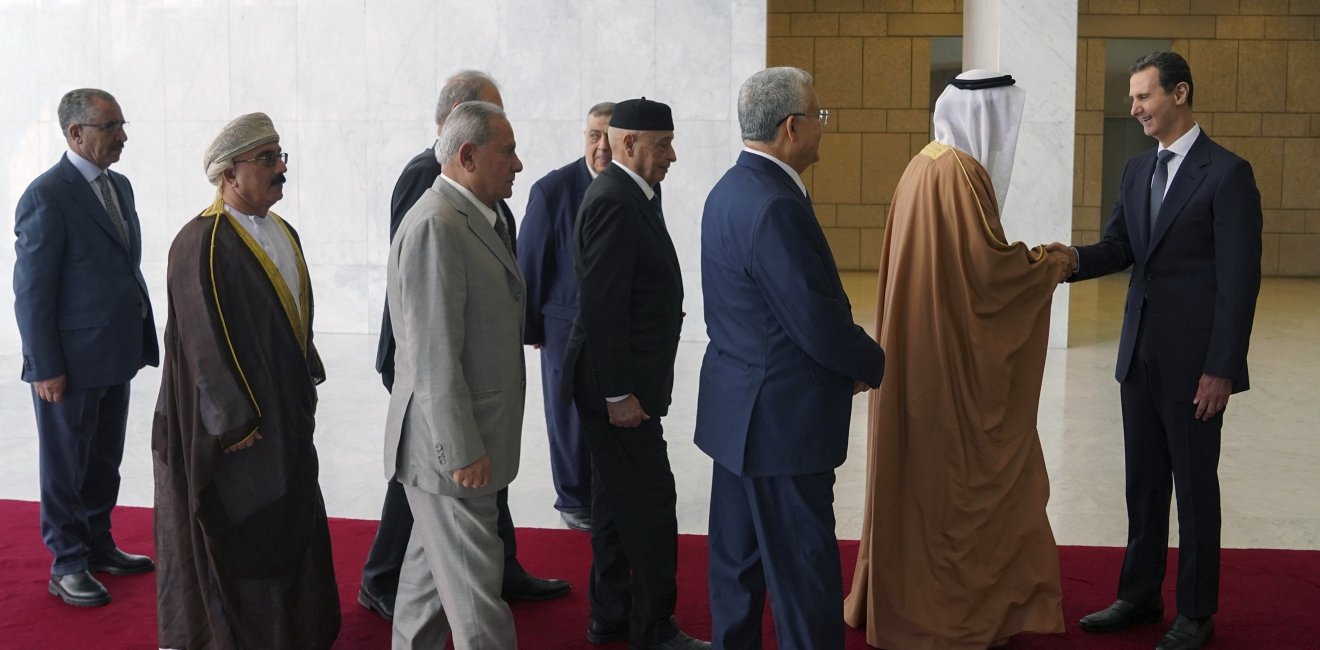The Syrian regime’s brutal repression of the civil uprising of 2011 raised concerns globally about human rights violations and crimes against humanity. In response, many states in the Arab region and beyond severed ties with the regime. Today, over half a million civilians have been killed and nearly 13 million have been displaced, including 6.7 million refugees, creating the world’s worst refugee crisis in modern history.
The offensive launched by Syrian opposition forces on November 27 has yielded an unprecedented shift in Syria’s stalemate that normalization efforts exerted over the past year have been unable to achieve.
For years, Syria has been stuck in a deadlock, with Bashar Al-Assad’s regime, the root cause of devastation, still in power. The offensive launched by Syrian opposition forces on November 27 has yielded an unprecedented shift in Syria’s stalemate that normalization efforts exerted over the past year have been unable to achieve. After Syria's readmission to the Arab League in 2023, many Arab leaders approached the Assad regime to resume diplomatic ties to "turn the page." Later, Turkey and even Italy also moved toward normalization.
The failure of Arab normalization
The decision to re-admit Syria to the Arab League in May 2023 was based on the assumption that diplomatic cooperation with the Syrian regime would resolve long-term regional issues involving Syria, including illicit drug activities and Syrian refugees, among others. Jordanian Foreign Minister Ayman Safadi advanced an explicit set of conditions for the gradual reintegration of Syria, a “step-for-step” process that was more or less accepted by other Arab states but never by Assad. A year later, attempts at diplomatic cooperation with the Syrian regime not only left these issues unresolved, but many of them worsened.
The UAE, Saudi Arabia, Jordan, and Iraq have faced issues with the cross-border smuggling of Captagon, a drug that has been reported to be mass-produced by the Syrian regime. Data shows cross-border drug smuggling actually increased almost three-fold since 2023.
Regarding refugees, approximately 2.3 million Syrians live in neighboring countries Lebanon, Jordan, Iraq and Egypt. The Lebanese government has been the most adamant on tackling the Syrian refugee crisis. On May 8 this year, the Lebanese government announced a strategy to “control and organize the file of Syrians present on Lebanese territory.” The strategy consisted of what Amnesty International described as “unprecedented and draconian measures,” placing hundreds of thousands of refugees at risk of deportation.
The issue of Syrian refugees surfaced once again as Israel’s war on Lebanon resulted in over 250,000 refugees entering Syria from Lebanon, most of whom were Syrians who were displaced once again. Upon arrival in Syria, they were subjected to arbitrary arrest, detention, and torture. In areas previously held by the opposition, the government imposed arbitrary restrictions on freedom of movement as a form of collective punishment, preventing people from returning to their cities and depriving them of their property, not to mention the cities and homes that were destroyed as a result of the regime's bombardment.
The Syrian government had no framework for the process of return of these refugees. Human rights organizations, including Amnesty International, Human Rights Watch, OHCHR, and others, unanimously agreed that no part of Syria was safe for refugee returns under the Assad regime. Resettling Syrians back to Syria under these conditions constituted a clear violation of their obligation to the principle of non-refoulement. Syrians who were to return to Syria under these conditions would undoubtedly attempt to seek asylum elsewhere. Therefore, this was an ineffective policy in the long run.
Italian and Turkish normalization
Despite the failed Arab experiment, this year, Italy and Turkey initiated efforts to normalize with the Assad regime.
Italy announced in July that it would appoint an ambassador to Syria to ‘turn the spotlight’ on the country. In November, the Syrian consulate in Rome announced its reopening. Italy’s move was, in part, reflective of the push for change in the EU’s policy towards the Assad regime to facilitate the return of Syrian refugees. If the EU continued in this trajectory, it would not see an end to refugee migration to Europe because the conditions that initially led to the crisis had not been resolved. The legitimacy of the role of the EU as an agent for upholding human rights is questionable as it was preparedto legitimize a regime that committed war crimes and crimes against humanity only to receive an unresolved, if not worsened, refugee crisis in return.
Assad’s lack of cooperation with Turkey proved that Assad never regarded diplomatic recognition as a strong enough incentive to put himself in a less favorable position to cooperate on actual solutions.
In parallel, Turkish President Recep Tayyip Erdogan’s attempt at rapprochement with Assad demonstrated the dangers of empowering the Syrian regime diplomatically. Despite the dire economic and political situation in Syria, Assad placed preconditions upon Turkey for diplomatic cooperation on “core” issues, such as the complete withdrawal of Turkey’s military presence in northern Syria. Assad’s lack of cooperation with Turkey proved that Assad never regarded diplomatic recognition as a strong enough incentive to put himself in a less favorable position to cooperate on actual solutions.
The accumulated diplomatic recognition received by Assad within the past year gave him disproportionate leverage and his persistence in maintaining a superior position on diplomatic cooperation undermined the policy goals of normalizing states.
The opposition offensive
On November 27, 2024, a coalition of Syrian opposition militias launched an offensive against Syrian Arab Army forces and successfully captured major Syrian cities, including Damascus, ultimately toppling the regime. Since Assad’s forces lost control of these cities, many Syrians who have been displaced for years are now returning to their homes and have been reunited with their families. The rebels say they found a vast haul of Captagon and vowed to destroy it. These developments indicate that solutions have advanced more since the fall of the regime than over the past year of renormalization.
Recent developments also indicate that Turkey’s inability to secure its vital interests in Syria through the diplomatic route may have prompted President Erdogan to give the green light to the Turkish-backed Syrian National Army (SNA) to launch offensives to establish a buffer zone to “neutralize” threats from Kurdish fighters, which Ankara perceives as a security threat, and to gain more territory to relocate Syrian refugees from Turkey.
The Assad regime failed to cooperate with other states to achieve unified goals or to adequately address the human rights concerns that led to its isolation in the first place. Therefore, normalization was not being granted to secure interests or as a bargaining chip to incentivize higher regard for human rights. States that normalized provided an unwarranted reward for brutal repression. The legitimacy granted to the Assad regime through normalization was an ineffective policy that had adverse consequences not only for Syrians but also for states that normalized. It was an utter betrayal to the Syrian people and their struggle. What this detached attempt at “turning the page” established is that moving forward, a human-centered approach is needed for Syria.
Foreign actors, Iran, Russia, Turkey, the United States, and Israel, among others, have varying agendas in Syria that could threaten the Syrian people’s prospects for peace and stability in this highly volatile moment. Shortly after the fall of the Assad regime, Israel began seizing territory in the Golan Heights in southwest Syria and carrying out hundreds of airstrikes across the country, violating its sovereignty.
Despite the world’s abandonment and normalization with their oppressor, the Syrian people brought a monumental end to 54 years of struggle under dictatorship.
Despite the world’s abandonment and normalization with their oppressor, the Syrian people brought a monumental end to 54 years of struggle under dictatorship. Foreign actors should respect the Syrian people’s right to an autonomous political transition and center the concerns and demands of the people when formulating their policy towards Syria to support a sustainable and stabilizing political solution. Otherwise, the issues that impacted the Syrian people, the region, and the world that could not be resolved in the past 13 years will persist or worsen.
The views expressed in this piece are those of the author and do not express the official position of the Wilson Center.








